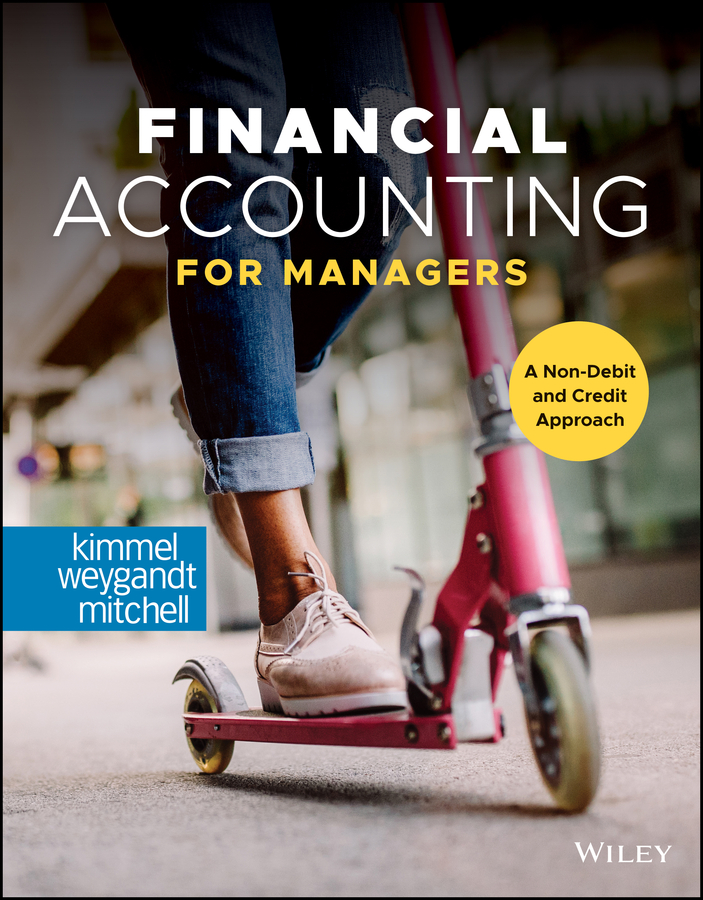
Financial Accounting for Managers, 1st Edition
By Paul D. Kimmel, Jerry J. Weygandt, Jill E. Mitchell
Financial Accounting for Managers presents a practical introduction to financial accounting with a focus on ho to use accounting to make business decisions, without the use of debits and credits. Students work through an active, hands-on learning experience to improve understanding, retention, and engagement with interactive tools that present bite-sized learning, video-based instruction, high-quality assessment, and Adaptive Assignments. These tools allow students to learn concepts more efficiently and understand the why and how of accounting application to real-world business practices.
In addition, Financial Accounting for Managers and WileyPLUS include a variety of hands-on activities and resources that enhance practical learning and key skills, including a running case, Gradable Excel assignments, various data analytics tools including the Data Analysis Technology Bootcamps, real-world videos, and leading industry topics such as ESG. These applications expose students to market-leading software and help develop critical thinking and business decision-making skills, preparing students for future job success no matter what path they take.
Schedule a Demo Request Instructor AccountWant to learn more about WileyPLUS? Click Here
Learn Accounting Concepts Efficiently
Help close the accounting cycle knowledge gap with the WileyPLUS Accounting Cycle Simulation. Students receive scenario-based practice with core steps of the accounting cycle, step-by-step learning and reinforcement of foundational building blocks, and detailed coach’s comments to provide dynamic, just-in-time feedback. Through this guided, interactive experience, students will better understand how the accounting cycle works and how each step can be applied to real accounting activities in Introductory Accounting
Solution Walkthrough Videos provide 24/7, just-in-time homework assistance for hundreds of exercises and problems in the WileyPLUS course. Thes videos break down the process of completing complex homework questions to help students build their understanding of tackling and working through an entire accounting problem, improving their understanding and increasing their confidence.
Adaptive Assignments ignite students’ confidence to persist so they can develop critical skills. By continuously adapting to each students’ needs and providing achievable goals with just-in-time instruction, Adaptive Assignments close knowledge gaps through scaffolded learning. Powered and refined by the Knewton Adaptive Engine, with more than 15 million users, this new assignment type gives instructors the flexibility and control to create targeted adaptive experiences that match their teaching preferences. With actionable analytics to support student and class intervention, Adaptive Assignments makes teaching and learning more efficient than ever.
Interactive Assignments to Keep Students Engaged
Interactive Tutorial Assignments provide a guided walkthrough and review of key chapter content and topics, including Chapter Overview Videos, Lecture Videos for each learning objective, and various real world videos featuring professionals in the field, such as Practice with a Pro and Ask an Expert. Embedded Interactive Knowledge Checks and Do It! questions ensure student understanding and word retention and build confidence. The Interactive Tutorial Assignments are also flexible and can be customizable, available as practice, or assignable for points.
Develop Data Analytics and Literacy Skills
Help students develop foundational data analytics software skills with Data Analysis Technology Bootcamps, available for Excel, Tableau, Power BI, Alteryx, and SQL. Each bootcamp includes Overview Videos, How-To Videos, and Solution Walkthrough Videos to ensure students have the support they need to learn how to use the software and perform specific tasks, as well as assignable application exercises and data sets to help students demonstrate their understanding of the tool in an accounting context.
Power BI and Tableau Visualization Assignments in WileyPLUS familiarize students with popular data analysis tools they will encounter in the workplace. Students analyze a variety of visualizations available in both software programs, completing assessment questions along the way to check their understanding and ability to interpret different forms of information, and practice making informed business decisions.
The WileyPLUS Data Set Library provides instructors with the flexibility to choose how they want to build and assess students’ data analytics skills. A variety of free data sets are available for you to access across all WileyPLUS Accounting courses, saving you valuable time in sourcing out data sets to use with projects, assessments, and homework.
Solve Business Problems with Excel
Gradable Excel Assignments develop the Excel knowledge and skills students need by giving them the opportunity to practice using formulas and functions to complete specific exercises in a real Microsoft Excel worksheet. With exercises based on accounting questions from the book, automatic grading, and immediate and detailed cell-level feedback, students build key skills needed to be competitive in today’s job market while enhancing their understanding of key accounting concepts.
Incorporate Cutting-Edge Topics
Introduce your students to ESG in the accounting context with the WileyPLUS ESG Module, designed to help students understand what ESG is, why it’s important, and how it’s changing the modern accounting and business world. Students work through each pillar of ESG through lessons on Environment, Social, Governance, and Reporting, along with relatable business scenarios with recognizable companies, access to real-world sample reports, and assignable quiz questions.
Additional Key Resources
- Financial Statement Transaction Illustrations demonstrate the analysis of business transactions. Each illustration shows the effect that a transaction has on 1) the basic accounting equation, 2) individual accounts, 3) the balance sheet and the income statement, and 4) cash.
- The bulleted text and numbered approach helps highlight key accounting information within each learning objective.
- Integrated practice at the point of learning and the end of each learning objective helps students ensure their understanding before moving on to more advanced material.
- Real World Company Videos feature both small businesses and lager companies highlighting how they use various important accounting concepts in their day-to-day operations.
- Data Analytics Insight boxes, integrated throughout the content, highlight the use of data analytics by real-world companies.
- Analytics in Action End-of-Chapter Sections include feature boxes and activities that get students hands-on with data analysis applications within a real Excel environment and practice working with varied data sets, refine their Excel efficiency skills, create visualizations, and learn how to think critically while evaluating and interpreting the data.
- ESG discussions, ESG Insights boxes, and ESG Reporting Cases are integrated throughout the content and help students understand current disclosure practices as well as how ESG reporting might impact future financial accounting.
- Decision Tools, integrated throughout the content, provides a summary of accounting concepts that are useful for management decision-making. A summary of Decision Tools is included within each chapter and includes Using the Decision Tools, which is a practice exercise with a corresponding solution.

Paul D. Kimmel, Ph.D., CPA, received his bachelor’s degree from the University of Minnesota and his doctorate in accounting from the University of Wisconsin. He is a Senior Lecturer at the University of Wisconsin-Madison and was an Associate Professor at University of Wisconsin – Milwaukee. He was the recipient of the UWM School of Business Advisory Council Teaching Award, the Reggie Taite Excellence in Teaching Award, and a three-time winner of the Outstanding Teaching Assistant Award at the University of Wisconsin. He has public accounting experience with Deloitte & Touche (Minneapolis) and was a recipient of the Elijah Watts Sells Award for Honorary Distinction for his results on the CPA exam. He is a member of the American Accounting Association and the Institute of Management Accountants and has published articles in Accounting Review, Accounting Horizons, Advances in Management Accounting, Managerial Finance, Issues in Accounting Education, Journal of Accounting Education, and in other journals. He has authored a number of introductory accounting textbooks, and published papers and given numerous talks on issues related to accounting education.

Jerry J. Weygandt, PhD, CPA, is Arthur Andersen Alumni Emeritus Professor of Accounting at the University of Wisconsin-Madison. He holds a PhD in accounting from the University of Illinois. Articles by Professor Weygandt have appeared in the Accounting Review, Journal of Accounting Research, Accounting Horizons, Journal of Accountancy, and other academic and professional journals. These articles have examined such financial reporting issues as accounting for price-level adjustments, pensions, convertible securities, stock option contracts, and interim reports. Professor Weygandt is author of other accounting and financial reporting books and is a member of the American Accounting Association, the American Institute of Certified Public Accountants, and the Wisconsin Society of Certified Public Accountants. He has served on numerous committees of the American Accounting Association and as a member of the editorial board of the Accounting Review; he also has served as president and secretary-treasurer of the American Accounting Association. In addition, he has been actively involved with the American Institute of Certified Public Accountants and has been a member of the Accounting Standards Executive Committee (AcSEC). He has served on the FASB task force that examined the reporting issues related to accounting for income taxes and served as a trustee of the Financial Accounting Foundation. Professor Weygandt has received the Chancellor’s Award for Excellence in Teaching and the Beta Gamma Sigma Dean’s Teaching Award. He is the recipient of the Wisconsin Institute of CPA’s Outstanding Educator’s Award and the Lifetime Achievement Award. In 2001, he received the American Accounting Association’s Outstanding Educator Award.

Jill E. Mitchell, MS, MEd, CIA, is a Lecturer at the McIntire School of Commerce at the University of Virginia. Prior to joining the faculty of McIntire, she was a Professor of Accounting at Northern Virginia Community College (NOVA), where she taught face-to-face, hybrid, and online courses and an adjunct instructor at George Mason University (GMU) where she taught in both undergraduate and graduate programs. She is a past president of the Washington, D.C. Chapter of the Accounting and Financial Women’s Alliance (AFWA), and she served on the board of directors of the Virginia Society of CPAs (VSCPA). She is a member of the American Accounting Association (AAA) and the Institute of Internal Auditors. Jill served on the AAA Education Committee and was the co-chair for the Conference on Teaching and Learning in Accounting (CTLA). Jill was a senior auditor with Ernst & Young’s Business Risk Services practice in Miami, Florida. She is a certified internal auditor and earned an MS in Accountancy from the University of Virginia, an MEd in Instructional Design Technology from George Mason University, and a BBA in Management Information Systems from the University of Georgia. Jill is a recipient of the Outstanding Faculty Award, the Commonwealth’s highest honor for faculty of Virginia’s universities and colleg-es presented by the State Council of Higher Education for Virginia; the Virginia Community College System Chancellor’s Award for Teaching Excellence; the AFWA’s Women Who Count Award; the AAA Two-Year College Educator of the Year Award; and the AAA/J. Michael and Mary Anne Cook/Deloitte Foundation Prize, the foremost recognition of an individual who consistently demonstrates the attributes of a superior teacher in the discipline of accounting.
Chapter 1: Introduction to Financial Statements Chapter 2: A Further Look at the Balance Sheet Chapter 3: The Accounting Information System Chapter 4: Accrual Accounting Concepts Chapter 5: Fraud, Internal Control, and Cash Chapter 6: Merchandising Operations and the Multiple-Step Income Statement Chapter 7: Reporting and Analyzing Inventory and Receivables Chapter 8: Reporting and Analyzing Long-Lived Assets Chapter 9: Reporting and Analyzing Liabilities Chapter 10: Reporting and Analyzing Stockholders’ Equity Chapter 11: Statement of Cash Flows Chapter 12: Financial Analysis: The Big Picture Appendix A: Specimen Financial Statements: Apply Inc.* Appendix B: Specimen Financial Statements: Columbia Sportswear Company* Appendix C: Specimen Financial Statements: Under Armour, Inc.* Appendix D: Double-Entry Accounting System* Appendix E: Time Value of Money* Appendix F: Reporting and Analyzing Investments* *Available in WileyPLUS or through Wiley Custom.

